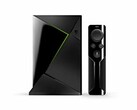The Nvidia Shield TV console is a pretty powerful video and game streaming device. When we reviewed the 2016 model, we found it handled Android games without issue and game streaming of titles that can handle higher input lag also worked well. But we considered the Shield TV was in its element when playing videos (including 4K) locally or over the internet.
When Nvidia released an updated model in early 2017, they kept the same internals but updated to Android 7.0 Nougat and implemented support for 4K HDR content. It was still one of the most powerful dedicated streaming devices, but the price was a bit high for many people who didn’t want the gaming abilities.
To fix this, Nvidia is hoping to make the Shield Android TV a more attractive option for consumers by releasing a version without the included game controller, but still including the Apple-TV-esque remote. The price has been dropped by US$20, to a more attractive US$179, which also happens to be the same price as the base model of the recently announced Apple TV 4K 32 GB that releases tomorrow.
The new controller-less Nvidia Shield TV 16 GB will be available from the 18th of October for US$179.
Loading Comments
I grew up in a family surrounded by technology, starting with my father loading up games for me on a Commodore 64, and later on a 486. In the late 90's and early 00's I started learning how to tinker with Windows, while also playing around with Linux distributions, both of which gave me an interest for learning how to make software do what you want it to do, and modifying settings that aren't normally user accessible. After this I started building my own computers, and tearing laptops apart, which gave me an insight into hardware and how it works in a complete system. Now keeping up with the latest in hardware and software news is a passion of mine.
> Expert Reviews and News on Laptops, Smartphones and Tech Innovations > News > News Archive > Newsarchive 2017 09 > Pre-orders open for a cheaper Nvidia Shield TV that comes without the game controller
Craig Ward, 2017-09-21 (Update: 2026-02-18)













